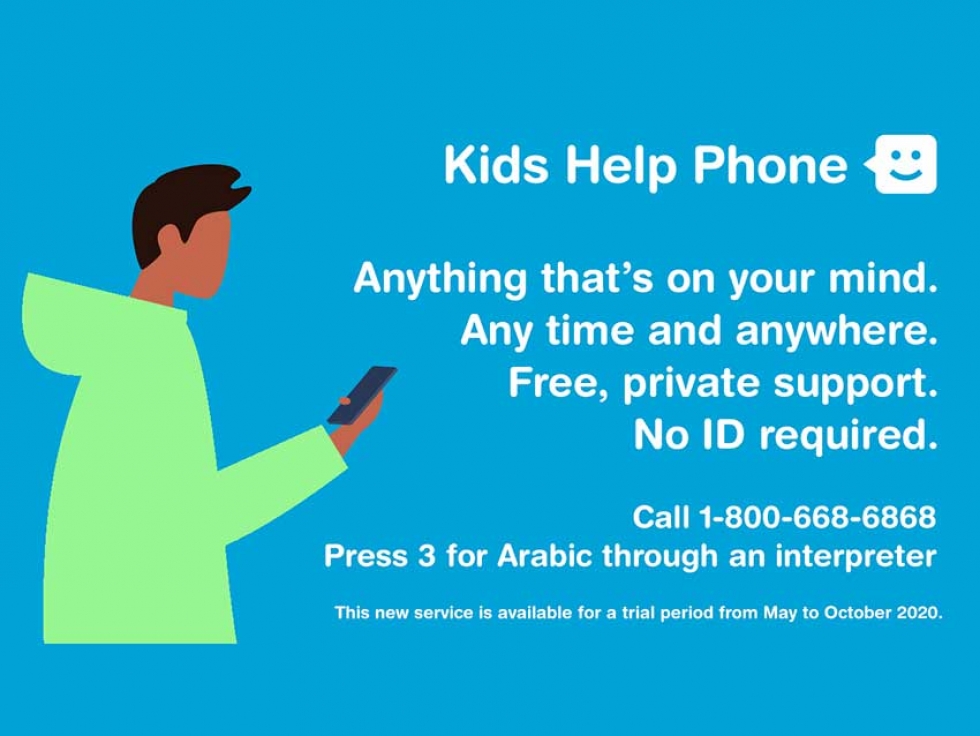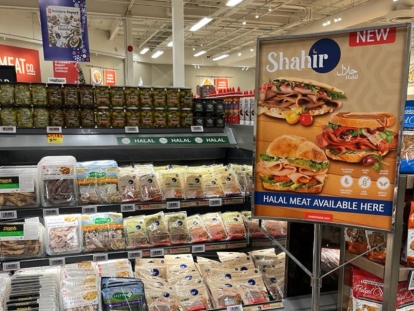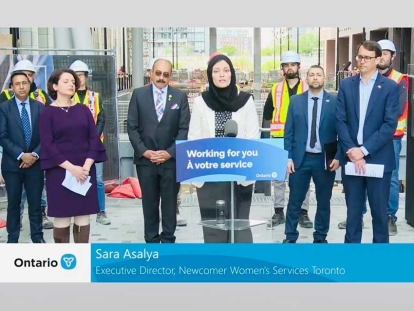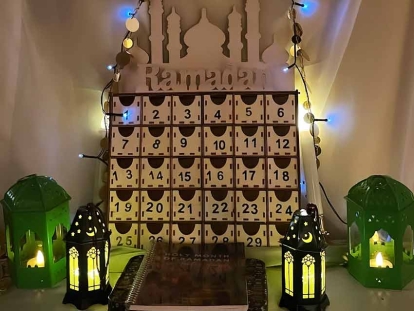
Sep
Kids Help Phone Pilot Project Makes Services Accessible to Arabic-Speaking Youth Across Canada
Written by Chelby DaigleCanada's Kids Help Phone is running a pilot project until December 31, 2020 offering services to Arabic-speaking callers through an Arabic interpreter.
Muslim Link interviewed Ravina Anthony, the manager of Newcomer and Diversity Initiatives at the Kids Help Phone, about the project and what it hopes to achieve.
Tell us about the Kids Help Phone's English and French languages services.
Kids Help Phone is Canada's only 24/7 e-mental health service offering free, confidential support in English and French to young people. As the country’s virtual care expert, we give millions of youth a safe, trusted space to talk over phone or through text in any moment of crisis or need.
Our professional counselling services are available by phone at 1-800-668-6868. Texting support is available for young people by texting ‘TALK’ to 6868686 and for adults by texting ‘WELLNESS’ at 741741. Both services are available 24/7 in English and French.
Young people and caring adults can also find useful resources and referrals through our website at www.kidshelpphone.ca.
Why was Kids Help Phone created and how is it funded?
Kids Help Phone was founded in 1989 as the first and only national e-mental health support service – the organization continues to be the only national service in Canada. Kids Help Phone gratefully relies on the generosity of donors, volunteers, stakeholder partners, corporate partners and governments to fuel and fund our programs.
What Arabic-language services are currently being offered?
Through the Newcomer Initiative for Arabic-Speaking Youth, Kids Help Phone is offering Arabic phone counselling, facilitated by an interpreter, for a trial period (May-December 2020). Young people who prefer to speak Arabic can call us for free, anonymous and confidential mental health support 24/7 at 1-800-668-6868 and select 3 for Arabic.
This pilot service, which launched in May and will run through to the end of December 2020, is available from anywhere within Canada, 24/7/365, completely anonymous and confidential, no ID required.
More information is available on our website at www.kidshelpphone.ca/ArabicYouth.
Why did the Kids Help Phone decide that it needed to add Arabic-language services?
We have been offering youth mental health support for over three decades and constantly look to innovate and meet youth where they are. This includes our
commitment to serving youth from a diverse set of backgrounds.
Recognizing the gap in mental health related services currently available to newcomers, especially in-language services, the Immigration, Refugees and Citizenship Canada (IRCC) - an organization that funds initiatives for newcomer settlement in Canada-provided funding to Kids Help Phone to provide a 6-month pilot project in a newcomer specific language.
The decision to offer Arabic came from multiple external stakeholder recommendations as well as our own research. We found that newcomers coming to Canada from Arabic- speaking countries (Syria and surrounding countries) were often found to have lower proficiency levels in English and/or French compared to other immigrants and also had larger family sizes with a higher number of young people under the age of 15 years.
What were some of the challenges experienced when trying to set up Arabic-language services?
We know from our experience of running a bilingual service, in English and French, how challenging it can be and so for this pilot project, we decided to engage with an interpreter service to support our service model. Our professional counsellors are well-trained in working with interpreters so that young people who prefer to use the Arabic service are met with a seamless experience when they call Kids Help Phone.
How are these services funded?
Our Newcomer Initiative for Arabic-Speaking youth is generously funded by the Immigration, Refugees, and Citizenship Canada (IRCC). However, once this funded pilot ends, we will be seeking an additional funds to continue to explore how to, and launch, services accessible in multiple languages.
What are the benefits of Arabic-speaking youth using these services and/or community members referring Arabic-speaking youth to these services?
We know that newcomers to Canada may experience a unique set of challenges and struggles. By offering this service, we’re empowering Arabic-speaking youth in Canada to reach out for support. We’re offering them a safe, trusted and non-judgmental space to talk and receive e-mental health support from a professional in a language they’re more comfortable speaking. The service is free, available across Canada, 24/7, and, being anonymous and confidential, we do not ask for parental consent or legal status from a young caller.
Community members referring callers to our service are ensuring that newcomer youth become better aware of the supports available to them which in turn provides better opportunities for them to seamlessly integrate into a new country. It also opens up opportunities for Kids Help Phone and newcomer-serving organizations to work together in making sure newcomer youth settlement needs are met.
Is there anything else you would like to add?
To call Kids Help Phone’s Arabic phone counselling service, call 1-800-668-6868 and select 3.
To look for ‘Newcomer Settlement Support’ near you, use Kids Help Phone’s Resources Around Me tool.
For more educational articles on being a newcomer in Canada, visit Kids Help Phone’s Newcomers Category page on our website
If you have already used the service and would like to submit feedback, feel free to fill out our anonymous and confidential survey at
www.kidshelpphone.ca/ArabicYouth; “Where can I share my feedback?”
To learn more about Kids Help Phone’s professional counsellors, watch this short video: A Day in the Life of a Counsellor. (It might take a few moments for the video to load from YouTube)
This article was produced exclusively for Muslim Link and should not be copied without prior permission from the site. For permission, please write to info@muslimlink.ca.






